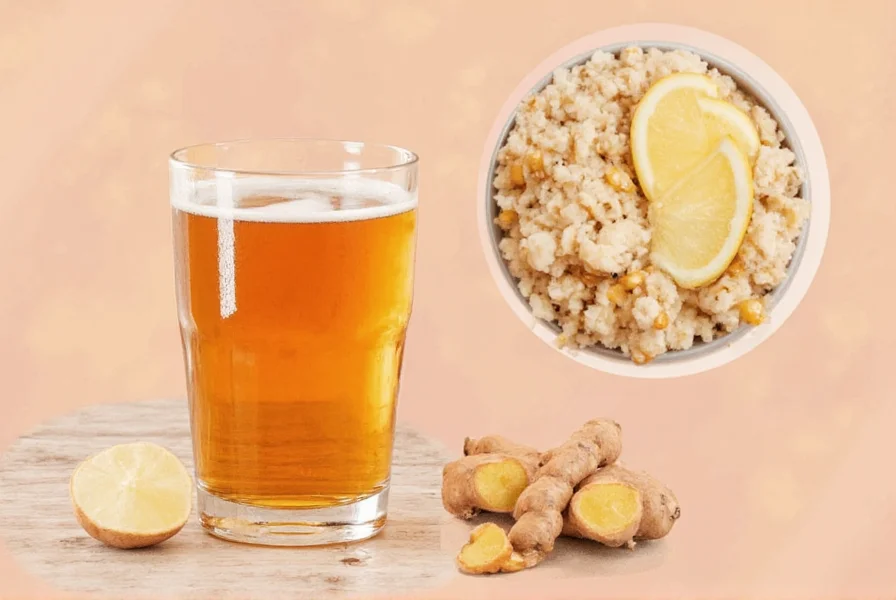When your stomach feels unsettled, reaching for ginger ale seems like a natural remedy. But does this popular carbonated beverage actually work, or is it just an old wives' tale? Let's examine the science behind ginger and digestive health to understand when ginger ale might help and when better alternatives exist.
The Science Behind Ginger and Digestive Relief
Ginger contains bioactive compounds called gingerols and shogaols that interact with your digestive system in several beneficial ways. Research published in the Journal of Gastroenterology and Hepatology shows these compounds:
- Accelerate gastric emptying, reducing feelings of fullness and discomfort
- Block serotonin receptors involved in nausea signaling
- Reduce inflammation in the gastrointestinal tract
- Exhibit antimicrobial properties that may combat certain stomach bugs
These mechanisms explain why ginger has been used as a digestive aid for centuries across various traditional medicine systems. However, the concentration of these active compounds determines effectiveness.
Ginger Ale vs. Real Ginger: A Critical Difference
Most mainstream ginger ales contain surprisingly little actual ginger. A 2022 analysis by the American Journal of Clinical Nutrition found that popular brands typically contain:
| Brand Type | Average Ginger Content | Sugar per 12oz | Effectiveness Rating |
|---|---|---|---|
| Mass-market brands | 0.1-0.5% | 35-45g | ★☆☆☆☆ |
| Craft/small-batch | 1-3% | 20-30g | ★★★☆☆ |
| Fresh ginger tea | 5-10% | 0-5g | ★★★★★ |
The sugar content in most commercial ginger ales presents a double-edged sword. While the carbonation may help relieve pressure, excessive sugar can actually worsen nausea for some people and feed harmful gut bacteria. This explains why many find ginger ale provides only temporary relief or sometimes aggravates symptoms.
When Ginger Ale Might Actually Help
Ginger ale shows the most promise for specific digestive issues:
- Motion sickness: The ginger content in quality brands may reduce nausea during travel
- Post-operative nausea: Some studies show ginger supplements help, though ginger ale's lower concentration makes it less effective
- Mild indigestion: The carbonation may help release trapped gas, while minimal ginger soothes irritation
However, ginger ale generally proves ineffective for:
- Severe vomiting episodes
- Food poisoning with bacterial origins
- Chronic digestive conditions like IBS or GERD
- Stomach flu with high fever
Better Alternatives for Upset Stomach Relief
For more reliable relief, consider these evidence-based options:
- Fresh ginger tea: Steep 1-2 inches of sliced ginger root in hot water for 10 minutes. This delivers 5-10 times more active compounds than commercial ginger ale.
- Ginger chews: Look for products with at least 25mg of gingerols per serving, which provide consistent dosing.
- Ginger capsules: Standardized supplements offer precise gingerol content (250-500mg) shown effective in clinical trials.
- Electrolyte solutions with ginger: For dehydration from vomiting, combine oral rehydration solutions with fresh ginger.
When preparing homemade remedies, remember that heating ginger actually increases the conversion of gingerols to more potent shogaols, enhancing its therapeutic effects.
Important Considerations and Safety
While generally safe, ginger isn't appropriate for everyone. Consult your healthcare provider before using ginger remedies if you:
- Take blood thinners (ginger may increase bleeding risk)
- Have gallstone disease (ginger stimulates bile production)
- Are pregnant beyond the first trimester (high doses may affect fetal development)
- Have diabetes (ginger may lower blood sugar)
Additionally, never use ginger as a substitute for medical care when experiencing:
- Vomiting lasting more than 24 hours
- Blood in vomit or stool
- Severe abdominal pain
- Signs of dehydration (dark urine, dizziness)
Practical Tips for Maximum Benefit
To get the most from ginger for digestive relief:
- Choose ginger products with at least 1% real ginger extract for noticeable effects
- Consume ginger before nausea becomes severe for best results
- Combine with peppermint for enhanced digestive soothing
- Avoid ice-cold ginger beverages, which may slow gastric emptying
- Start with small doses (1/4 cup ginger tea) and gradually increase
For children experiencing upset stomach, consult a pediatrician before administering ginger products. Most experts recommend waiting until age 2 before introducing ginger, and then using only highly diluted preparations.

Conclusion
Ginger ale's reputation as a stomach remedy comes from its namesake ingredient, but most commercial versions contain insufficient ginger to provide meaningful relief. For genuine digestive benefits, opt for products with substantial ginger content or prepare fresh ginger tea. While ginger can help with mild nausea and indigestion, recognize its limitations and seek medical attention for persistent or severe symptoms. Understanding the difference between marketing claims and evidence-based remedies ensures you make informed choices when your stomach needs soothing.

Does ginger ale help with nausea from chemotherapy?
While some cancer patients report mild relief from ginger ale, clinical studies show fresh ginger or standardized supplements (providing 0.5-1g of ginger) are significantly more effective for chemotherapy-induced nausea. Most commercial ginger ales contain too little ginger to impact severe treatment-related nausea.
What's the best ginger ale brand for upset stomach?
Look for brands listing 'real ginger' or 'ginger root extract' high in the ingredients, with at least 1% ginger content. Brands like Reed's Strongest Ginger Beer, Bruce's Ginger Ale, and homemade versions typically contain sufficient gingerols for digestive benefits, unlike mainstream options like Canada Dry or Schweppes.
How much ginger should I consume for an upset stomach?
For mild nausea, 0.5-1g of fresh ginger (about 1/4 to 1/2 teaspoon grated) in tea form is typically effective. Studies show doses of 250-500mg of ginger extract taken 3-4 times daily provide optimal relief. Start with smaller amounts to assess tolerance before increasing.
Can children drink ginger ale for stomach bugs?
For children over 2 years, small amounts of ginger ale with real ginger content may provide mild relief, but pediatricians generally recommend oral rehydration solutions instead. Avoid high-sugar commercial ginger ales as they may worsen diarrhea. Always consult a pediatrician before giving ginger remedies to children under 2 or for persistent vomiting.
Why does ginger help settle an upset stomach?
Ginger contains compounds called gingerols that accelerate gastric emptying, block nausea-inducing serotonin receptors, reduce gastrointestinal inflammation, and exhibit antimicrobial properties. These mechanisms work together to calm digestive distress, making it effective for motion sickness, morning sickness, and mild indigestion when consumed in sufficient concentrations.










 浙公网安备
33010002000092号
浙公网安备
33010002000092号 浙B2-20120091-4
浙B2-20120091-4